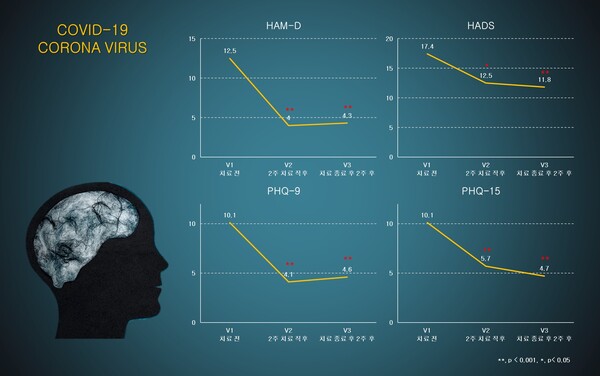Ybrain, a company specializing in mental health therapeutics, said on Thursday that its depression electroceutical, MINDD STIM, showed significant improvement in a study of Covid-19 patients suffering from brain fog.

Brain fog occurs when a person feels depression, fatigue, and cognitive decline and is characterized by confusion, forgetfulness, and a lack of focus and mental clarity.
The study investigated the use of transcranial direct current stimulation (tDCS) to treat subjective cognitive decline and depression after Covid-19 infection.
A team of researchers from the New Medical Technology Evaluation unit of the Ministry of Health and Welfare, led by Professor Ahn Jae-eun of the Mental Health Department at National Health Insurance Service, Ilsan Hospital, conducted the study for four months from September to December last year.
The study included a total of 25 patients aged 19 to 65 who complained of mild depression, subjective cognitive decline, and decreased attention after being diagnosed with Covid-19. Patients with pre-Covid depression and cognitive decline were excluded from the study.
The study was conducted by applying the electroceutical device for 30 minutes once a day for two weeks. Only the first session was conducted in the clinic, and the remaining 13 sessions were conducted at home. The effectiveness of the treatment was assessed by clinical psychological questionnaires, comprehensive attention tests, and electroencephalograms for depression and subjective cognitive decline experienced by patients immediately after the treatment was completed and two weeks after the end of the treatment.
There were significant improvements in depression on all scales, including the Hamilton Depression Rating Scale, Depression Screening Tool, and Hospital Anxiety Depression Scale, immediately after treatment, and similar results were also achieved two weeks after treatment.
Additionally, the subjective memory impairment scale showed a significant improvement in subjective memory impairment, including an increase in subjective satisfaction with current memory function and a decrease in the frequency of memory problems, and patient's satisfaction with their quality of life was also evaluated as improved.
"In this study, we were able to achieve meaningful improvements by applying MINDD STIM not only to patients with existing depression but also to patients experiencing depression due to Covid-19," said Ybrain CEO Lee Ki-won. "We will continue to apply MINDD STIM to research on various forms of depression in society so that we can lead active treatment for the disease."
The research results were first presented at the Korean NeuroPsychiatric Association Spring Meeting on April 20 by Professor Ahn and will later be published in an academic journal.
Related articles
- ChatGPT vs psychologist. How far has generative AI come?
- Ybrain, Chong Kun Dang to work for early depression diagnosis, treatment
- AMD patients should be careful of ‘depression’
- Ybrain provides real-world evidence for developing global tCDS industry standards
- Dong-A Pharm jumps into electroceutical biz with Nu Eyne
- Electroceuticals empower Korean biopharma's growth
- Can winter swimming boost mental health?
- Ybrain wins ₩2.4 bil. won state funding to develop electroceutical for perinatal depression
- Ybrain partners with Friend & Companion to expand neurological diagnostics market with MINDD SCAN
- Ybrain and Meditrix to collaborate on mind health digital devices

